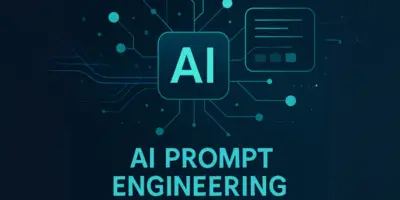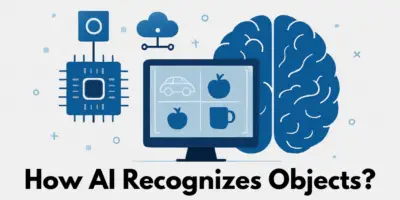Ever since artificial intelligence tools burst onto the scene, they’ve created quite a stir in our daily lives. And let’s be real here – it’s not just limited to programming anymore. The emergence of these AI tools has sparked endless discussions, with many people genuinely worried about their jobs. New positions are popping up while traditional roles are diminishing, companies are laying off staff, and the whole situation has gotten pretty heated.
Most people are struggling to wrap their heads around the sheer magnitude of change AI brings. But amid all this chaos, there’s been a flood of myths and misconceptions about artificial intelligence that give it far more credit (or blame) than it deserves.
In this post, I’m going to set the record straight on five widespread myths about AI that are simply not true. Let’s dive in!
Table of Contents
Myth #1: “AI Can Think on Its Own”
From the moment deep learning models like ChatGPT introduced their “deep thinking” option (or similar features), people started believing that AI was actually sitting there… thinking. Many assumed it was making genuine decisions and forming real thoughts.
The reality? AI is just an algorithm – nothing more, nothing less.
These algorithms are built on purely mathematical foundations, developed with human knowledge as their base. And trust me, these algorithms are far from knowing everything (which is why they’re constantly being updated).
The AI process is simple: input data goes in, and decisions come out based on statistics and clear mathematical equations. It’s completely logical – as straightforward as 1+1=2. AI doesn’t “think” or make decisions independently; it generates outputs based strictly on the data it has, which certainly doesn’t encompass the full range of human consciousness or awareness.
So let’s put this notion to rest: AI doesn’t think. It simply retrieves information from its available data and presents it to you.
Myth #2: “AI Will Replace All Programmers”
This one’s been causing panic attacks in dev communities worldwide! The truth is, practically everyone in the tech world would love to replace programmers – and I get why. Training a skilled developer takes a tremendous amount of time, their salaries are substantial, and the turnover rate between companies is extremely high. The whole process of losing a programmer and hiring a new one is honestly a massive headache, not to mention expensive.
So yes, companies want to reduce their dependence on human programmers. And with AI now able to write code, does this mean it’ll eventually replace programmers entirely?
The answer is a resounding no.
AI is a powerful assistant for programmers, no doubt. When it first arrived, it created anxiety in developer communities, but as time passes, the demand for programmers is actually increasing. What’s changing are the requirements and expectations from the market – you need to adapt quickly to stay relevant.
The idea that AI could completely replace software engineers who gather client requirements, implement them, track changes, and fix issues is pretty far-fetched. Even the code written by AI often has plenty of problems that human programmers need to fix. How could AI possibly replace something it can’t even perfect?
Myth #3: “I Don’t Need to Learn Programming Basics Because of AI”
This misconception has affected a huge number of programmers: “Since AI can write code, I don’t need to learn programming fundamentals. I’ll just rely on AI, grab some info here and there, and I’ll be good to go. There must be demand for this type of programmer in the market, right?”
Wrong.
Here’s the truth about this terrible myth: AI gives better results to people who already have knowledge. The more knowledge you have, the more you can extract from tools like ChatGPT. This is why senior developers and team leads can benefit from AI much more – they have deeper knowledge, allowing them to get richer outputs.
If you don’t know programming basics, you won’t be able to:
- Evaluate the quality of AI-generated code
- Make necessary corrections
- Write effective prompts to get the results you want
Without foundational knowledge, you simply won’t benefit from AI. Programming knowledge isn’t just about coding – it includes networking, security, cloud computing, operating systems, databases, query optimization, software engineering lifecycles, and more. When you have this knowledge base, you can craft better prompts, get better outputs, refine those prompts, and ultimately create something useful.
Without this foundation? AI won’t help you at all.
Myth #4: “AI Can Do Everything Now”
This feeling has taken hold of many people – not just programmers, but also those working in marketing, HR, accounting, and other fields. There’s this pervasive sense that AI can do almost anything.
I want to clarify something important: sure, AI performs impressive feats right before your eyes, but behind the scenes, it messes up constantly. There are straightforward questions that produce bizarre, incorrect answers. And don’t limit this observation to technical fields – try testing ChatGPT in other domains like marketing or accounting. You’ll find it making shocking errors even on simple, clear-cut tasks.
If it struggles with straightforward questions, imagine how it performs with complex, detailed requests! It often fails to deliver what you’re looking for.
Coming back to my earlier point: the more knowledge you have, the more you can get from AI. Try watching someone without relevant knowledge use AI and look at their results – you’ll quickly realize that AI still has a very long way to go before it becomes truly concerning.
AI has reached its limit in understanding context or comprehending what we’re discussing. Developers are trying to expand its capabilities as much as possible, but they’re struggling. Instead, they’re focusing on other improvements – better interfaces, prettier responses, additional features – while trying to fix the core understanding issue.
Keep in mind that AI is being marketed brilliantly. It’s generating enormous profits for the companies that created it, so they’re incentivized to promote it effectively. But the end results? Still pretty ordinary, nothing to be afraid of or overly impressed by.
Myth #5: “If You Don’t Learn AI Now, You’ll Fall Behind”
I hear this frequently from programming learners: “If you don’t learn AI right now, you’ll fall way behind, everyone will surpass you, so don’t learn programming – go learn AI instead.”
The people saying this usually have no idea about programming, AI, or our field in general. They’re outsiders who just hear that AI is evolving and jump to conclusions.
Listen, you simply cannot work in the AI field without being a programmer first. To create a program, tool, or anything that incorporates AI, you have a few options:
- Integration with existing AI tools: You can build a regular website using ASP.NET, PHP, or Node.js, then use APIs from ChatGPT, Gemini, or similar services to get data and incorporate it into your site. Boom – you have AI functionality.
- Using existing services: You can leverage services like Microsoft Azure or Google Cloud APIs that have pre-built AI capabilities, allowing you to build AI applications without extensive effort.
- Creating your own model: This is probably unnecessary right now given the abundance of available models. You can use any ready-made model that serves your purpose.
If you’re inventing something completely new like your own ChatGPT, that’s a different story altogether. You’d need to build your own system and train it, requiring enormous computing power and funding that might not be accessible in many regions. Even if resources were available, the number of people working in this specific area is limited, and the salaries for such positions typically require employment at major tech companies.
My advice? Learn programming fundamentals first, get solid skills in web or mobile development, and learn how to integrate AI into what you’ve learned. Then start thinking about advancing your AI skills. Don’t waste time on something that might be overhyped or that you can’t realistically work in right now.
Start with something that will put food on the table, then gradually develop your AI knowledge until you reach your desired level.
Conclusion
I hope this post has cleared up some of the misconceptions or concerns you might have had about artificial intelligence. I want to emphasize that you shouldn’t worry about these technological developments taking away your opportunities in the job market.
What will actually cost you opportunities is falling behind in your own development, not keeping up with new technologies, or delaying your learning journey. The real threat isn’t AI – it’s stagnation.
I hope you found this helpful. If you did, share it with your friends who might be struggling with similar concerns about AI!


